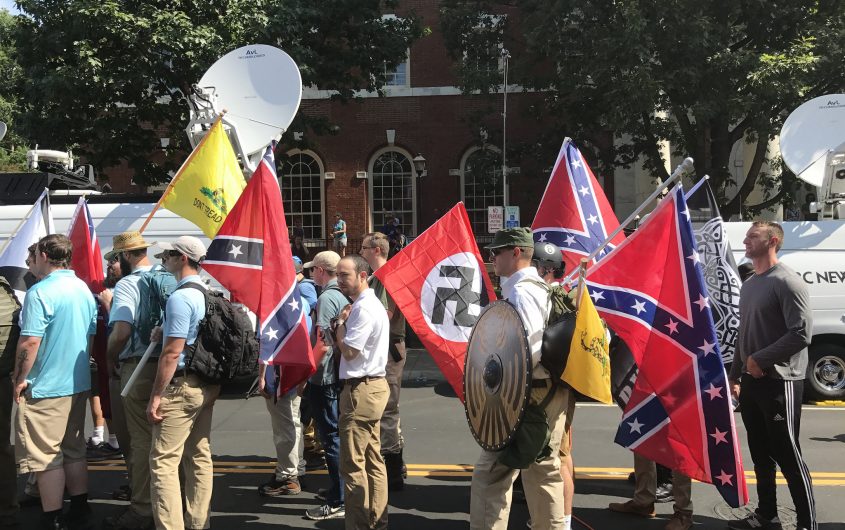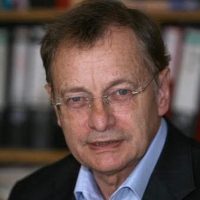
The Radicalization of the Extreme Right

Hajo Funke
Prof. Dr. Hajo Funke was a DAAD/AICGS Research Fellow from October to December 2018. He has conducted studies on terrorism (NSU) from 2011-2018, was Guest Professor on Holocaust Studies and Communication at Touro College Berlin from 2007-2015, and was Chair on politics and culture at the Otto-Suhr-Institute of Political Science at Free University Berlin from 1993-2010. He served as an expert witness in the London trial David Irving vs Deborah Lipstadt (1998-2000) and in various investigation committees of state parliaments on terrorism (NSU) (2014-2016). His research focuses on Political Culture in Modern Germany; National Socialism and Post-Holocaust History; Nationalism and German and Austrian Right-wing Extremism; and Conflict Studies (especially South-East-Europe, Mid-East). Recent publications include: with Walid Nakschbandi, Deutschland. Die herausgeforderte Demokratie (2017); with Christiane Mudra, Gäriger Haufen. Die AfD: Ressentiments, Regimewechsel & Völkische Radikale (2018); Sicherheitsrisiko Verfassungsschutz (2017); Der Kampf um die Erinnerung – Nationalsozialismus, Erlösungswahn und Massenmord (forthcoming); Die andere Erinnerung (1989; as E-Book forthcoming).
While at AICGS, Prof. Dr. Funke will work on a project entitled, “On Populism and Democracy. The Case of Charlottesville Events in August 2017 and Chemnitz Events in August/September 2018.” The comparison will give a more precise view of the developments in both cases, especially on the conditions of radicalization by certain organizing groups and their specific, often violent and dangerous parts, particularly their neo-Nazi orientation. Second, he will examine the importance of social and cultural alienation from democracy and how authoritarian attitudes mobilize the kind and extent of radicalization of moods and movements against well-defined minorities who have been declared enemies.
The Rallies in Charlottesville in August 2017 and Chemnitz in August 2018
In August 2017, members of multiple far-right movements rallied in Charlottesville, Virginia, with the goals of uniting the American white nationalist movement and opposing the removal of a statue of Robert E. Lee. The rally turned violent, ending with dozens of injuries and the murder of counter-protestor Heather Heyer. A year later, members of the far right movement rioted in Chemnitz, Germany, against immigrants and refugees. On November 27, 2018, DAAD/AGI Research Fellow Prof. Dr. Hajo Funke gave a seminar on the developments in both cases, especially on the conditions of radicalization by certain organizing groups and their specific, often violent and dangerous parts, particularly their neo-Nazi orientation. The seminar examined the similarities and differences of neo-Nazi ideologies and grouping; the reaction of security institutions, especially the police, during the two events; and the public and political reactions.
Key Takeaways
- Right wing populism and radicalism is on the upswing worldwide.
- For many, it offers “solutions” in scapegoats and provides an outlet for rage.
The Case of Chemnitz
- The spark for the August 2018 riots was the killing of a Cuban German by refugees.
- Organization: a neo-Nazi football supporters club organized on social media and marched, threatening violence toward refugees and destroying “stumbling stones,” plaques remembering Holocaust victims. The gathering was a spontaneous reaction to a current event.
- Setting: Eastern Germany is known for having multiple hotspots of right wing nationalism; Chemnitz was considered a safe city for right wing nationalists.
- Reaction of security services: Police were unable to stop the marches or the violence. Efforts are being made to remedy the weak security response. Security forces are still struggling to find ways to deal with misinformation and right-wing organization spread through social media.
- Political reaction: The right wing Alternative for Germany stood with PEGIDA and the neo-Nazi demonstrators in Chemnitz on September 1. It was shocking to many Germans that a party sitting in Parliament would send representatives to publicly support violent, racist, and xenophobic views. Chancellor Merkel condemned the violence without reservation, as did Annegret Kramp-Karrenbauer.
- Public reaction: On October 13, 2018, approximately 250,000 demonstrators gathered in Berlin under the slogan “unteilbar” (indivisible) to protest the far right and support marginalized groups in Germany.
The Case of Charlottesville
- The spark for the August 2017 demonstrations was the removal of a statue of Robert E. Lee.
- Organization: Jason Kessler and Richard Spencer, both white supremacists, planned a rally to bring together the various alt-right, alt-light, and confederate supporter organizations in the United States. This was planned far in advance of the removal of the statue.
- Setting: Charlottesville is a small, liberal-leaning college town; very different from Chemnitz where there was already an extremist presence.
- Reaction of security services: Police units were in chaos, without communication, and at one point pushed demonstrators into each other. A state of emergency was declared in Virginia, but it came too late for successful backup. Institutions are conducting legal proceedings against the murderer of Heather Heyer. Security forces are still struggling to find ways to deal with misinformation and right-wing organization spread through social media.
- Political reaction: President Donald Trump said there was blame “on both sides” when asked about the violence in Charlottesville. Attorney General Jeff Sessions described the car attack as domestic terrorism. Multiple senators, both republican and democrat, condemned the rally.
What is the political will of German and American institutions to deal with right wing extremism?
- In Germany, public struggle for a greater recognition of the rights of minorities depends on intensified civic engagement and defense of the Constitution against right-wing radical parties.
- The United States must face its historical legacy of slavery, racism, and segregation.
- Is the solution better security coordination? Both Germany and the United States must ensure that strengthened security services do not hurt the minority groups they are meant to protect.






